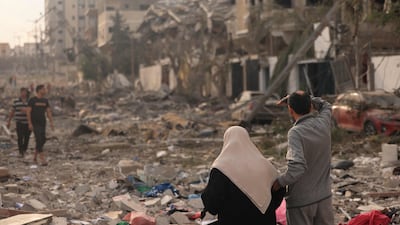Live updates: Follow the latest news on Israel-Gaza
A food distributor in Gaza has said supplies will last for only “several days”, while the Palestinian Red Crescent said fuel could run out in five days, as Israel imposes a total siege on the enclave that includes cutting off electricity, food and water in its war with Hamas militants.
The Red Crescent said its own teams are struggling to pull people out from under the rubble, especially at night with no electricity.
"There are only four hours of electricity at the moment and even then we rely on back-up generators, which will surely run out of fuel. We have a maximum supply of five days' worth," Red Crescent spokeswoman Nibal Farsakh told The National.
"We are heading for a humanitarian crisis."
Speaking to The National, 43-year-old Abu Mohammad Hassouneh said he had been risking his life to restock shop owners' dwindling supplies.
“I was not planning on leaving my home but many called me asking me for dairy products. I risked my life to go out and I was placed in very dangerous situations on several occasions,” he said.
“We went outside in the midst of the bombing and shelling,” he said, speaking by phone as explosions could be heard in the background.
“Shelves were empty. Our products are usually in very high demand and finish quickly. All the other items are out of stock as well, like rice, grains and canned goods,” he said.
“You can pretty much say there isn't any more dairy or cheese in the market.” He predicted supplies would last “several days at most”.
“Even people going out to buy these things are risking their own lives. They looked afraid and the streets were empty.”
UN Secretary General Antonio Guterres said Israel's siege is compounding an already dire situation and seriously affecting the provision of basic health care in Gaza.
“The humanitarian situation in Gaza was extremely dire before these hostilities and now it will only deteriorate exponentially. Medical equipment, food, fuel and other humanitarian supplies are desperately needed along with access for humanitarian personnel,” Mr Guterres said.
“I urge all sides and the relevant parties to allow the United Nations access to deliver urgent humanitarian assistance to Palestinian civilians trapped and helpless in the Gaza Strip.”
In response to Israeli Defence Minister Yoav Gallant's announcement of a tightened blockade for the Gaza Strip, UN human rights chief Volker Turk said “sieges” that endanger the lives of civilians are prohibited under international law.
On Tuesday, Jordan's King Abdullah II issued an order to dispatch "urgent humanitarian and medical aid" to the Palestinians in Gaza through the Rafah crossing, "in full prior co-ordination with Egypt".
The Rafah crossing was also targeted in the airstrikes.
The Palestinian Red Crescent Society said three of its ambulances have been destroyed in Israeli strikes on Gaza as it continues to work with people needing medical and emergency assistance.
"Many residential buildings have been struck without warning," Ms Farsakh said. "In the few cases that there have been warnings, in the form of a 'warning rocket', the time between the actual strike and the warning did not account for the time needed for the elderly and disabled to evacuated."
Gaza's already fragile medical sector is also having to face a significant number of incoming casualties as the death toll crosses 765, with the number of injuries rising beyond 4,000.
“The medical sector in Gaza suffers from a severe shortage of medical and technical supplies that will be exacerbated by the total siege,” a Hamas government representative told The National.
“Now, under the conflict and escalation and closing of borders and electricity, except that which is provided by generators, is going to add a great burden to the sector,” Tayseer Mhesen said.
“Medical supplies in the health wards are simply not enough for taking on the task of handling the incoming injuries and casualties,” he said, adding that the Ministry of Health has called upon doctors and medical staff to head to major hospitals in the besieged strip.
Mr Mhesen said that while the majority of Gaza's biggest hospitals remain operational, they are working at a “very limited capacity”.
The spokesman for the Hamas-run Health Ministry, Dr Ashraf Al Qudra, told The National that “tens” of people remain under the rubble.
“Six medical staff members have been killed and at least 15 ambulance vehicles have been destroyed. The areas surrounding hospitals have been targeted in order to incapacitate our medical staff. We will remain on site as long as there are people injured. We need medical staff to be protected and supported.”
The World Health Organisation called for a humanitarian corridor to be established into the Gaza Strip, adding that there have been 13 attacks on health facilities since the escalation began on Saturday.
The Who said all its medical supplies have been used up.
“Who is calling for an end to the violence? A humanitarian corridor is needed to reach people with critical medical supplies,” spokesman Tarik Jasarevic said during a press briefing in Geneva on Tuesday.
The UN Relief and Works Agency (UNRWA) said its headquarters in Gaza sustained "significant damage" in air strikes on Monday night.
"All UN international staff present in Gaza are taking shelter in another building within the same compound," it said, adding that none of its staff were killed in the incident.
However, two UNRWA staff and five pupils who attend UNRWA-funded schools have been killed since the hostilities began, the statement added.
"Since October 7, UNRWA recorded both collateral and direct damage to at least 18 of its facilities including schools sheltering displaced civilians," the statement said.
Nearly 190,000 people have been internally displaced in Gaza, with more than 137,000 taking shelter in more than 80 UNRWA schools across the Gaza Strip, the agency said.

